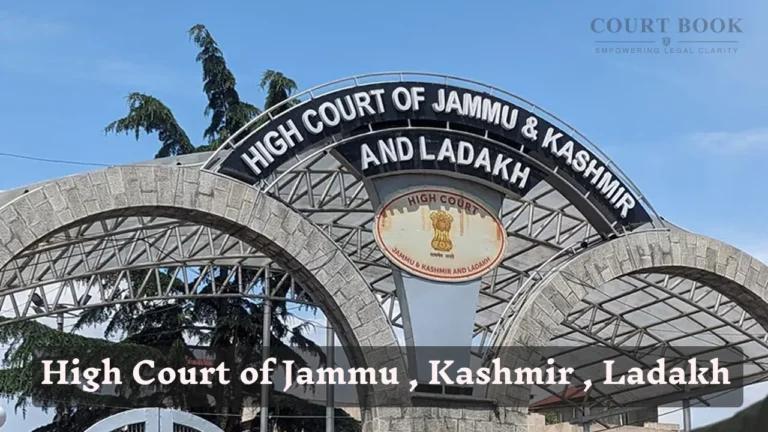Clarifying a long-standing debate in commercial driving license categories, the High Court of Jammu & Kashmir and Ladakh has held that any person holding a valid licence to drive a “transport vehicle” is legally eligible to drive both heavy goods vehicles and passenger-carrying vehicles. A separate Public Service Vehicle (PSV) endorsement is not necessary under the amended Motor Vehicles Act.
This landmark clarification came from a judgment delivered by Justice Mohammad Yousuf Wani in the case titled National Insurance Co. Ltd vs Naresh Kumar & Others. The judgment was passed on 15 July 2025, in an appeal filed under Section 173 of the Motor Vehicles Act, 1988, challenging the earlier award passed by the Motor Accidents Claims Tribunal (MACT), Jammu.
“Therefore, any person who was holding a driving license authorizing him to drive a particular type of commercial vehicle would automatically be eligible to drive any other type of commercial vehicle,”
— Justice Mohammad Yousuf Wani
Read also:- Supreme Court: Entire Appeal Fails If Legal Heirs of Deceased in Joint Decree Are Not Added in Time
Background of the Case
The insurance company had argued that the driver of the offending vehicle only possessed a license to drive a Heavy Goods Vehicle (HGV) and not a passenger bus, thus violating policy terms. It contended that a PSV endorsement was required for driving a passenger vehicle, and the absence of such an endorsement should absolve the insurer from liability.
Additionally, the appellant challenged the MACT's decision to close its evidence without summoning witnesses and objected to the 7.5% interest rate granted on the awarded compensation, calling it excessive compared to prevailing bank deposit rates.
Read also:- Kerala High Court Quashes Defamation Case Against Mohiniyattom Artists
To resolve the licensing dispute, the Court examined several definitions under the Motor Vehicles Act, 1988, including:
Section 2(14): Defines "goods carriage"
Section 2(16): Defines "heavy goods vehicle"
Section 2(35): Defines "public service vehicle"
Section 2(47): Defines "transport vehicle"
“Every heavy goods vehicle is a goods carriage, whereas a transport vehicle includes within its definition both public service vehicle and goods carriage,”
— Observation by J&K High Court
Read also:- Supreme Court Questions BCI on Relaxing AIBE Fee for Poor Law Graduates
The Court noted that since the 1994 amendment to Section 10(2) of the Act (effective from 14 November 1994), licenses for commercial vehicles are issued under a unified category called 'transport vehicle', which includes both goods and passenger vehicles.
Therefore, a driver authorized to drive one type of commercial vehicle (e.g., a heavy goods truck) is also authorized to drive any other type (e.g., a passenger bus), without the need for a separate PSV endorsement.
Addressing Previous Conflicting Rulings
The Insurance Company relied on an earlier judgment, National Insurance Co. Ltd vs Bashir Ahmed Chopan (2012), which had held that PSV endorsement was mandatory. However, Justice Wani rejected this reliance, declaring the judgment as “per incuriam” (a decision made in ignorance of a binding precedent) since it overlooked relevant provisions of the Act.
Read also:- Bombay High Court: UAPA is a Deterrent Law, Not a Preventive Detention Legislation
“The ratio laid down in the said case is per incuriam and not a binding precedent… Even otherwise also, the said judgment has been passed without taking note of the binding precedent,”
— Justice Mohammad Yousuf Wani
Instead, the Court reaffirmed the view established in National Insurance Co. Ltd vs Mohd Sadiq Kuchay (2008), and followed consistent rulings by Coordinate Benches in:
- New India Assurance Co. Ltd vs Jagjeet Singh (2023)
- Oriental Insurance Co. vs Nirmala Devi (2024)
The High Court also addressed the appellant’s objection to the 7.5% annual interest rate on the compensation amount. It held that the rate is not excessive and does not warrant interference.
Read also:- Fake 'Supreme Court of Karnataka' Account Shown in Court to Highlight Social Media Misuse
On the procedural lapse claimed by the Insurance Company regarding the calling of witnesses, the Court found no illegality in the Tribunal’s conduct.
Justice Wani dismissed the appeal, observing that the MACT’s decision was lawful and well-reasoned.
“The appeal seems to be devoid of any merit and is, accordingly, dismissed,”
— Final Order by Justice Wani
He also ordered that any compensation amount deposited with the Registry of the Court should be released to the claimants in accordance with the Award.
Case Title: National Insurance Co Vs Naresh Kumar















